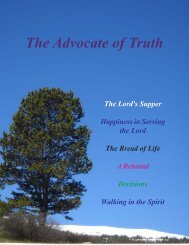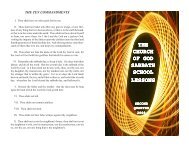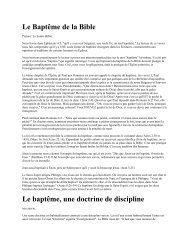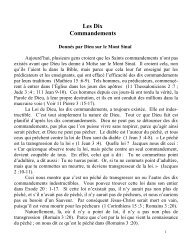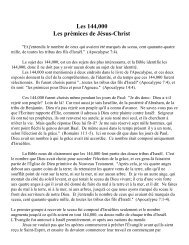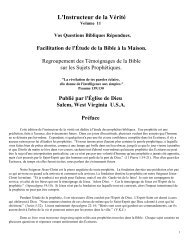The Advocate of Truth - Church of God (7th Day)
The Advocate of Truth - Church of God (7th Day)
The Advocate of Truth - Church of God (7th Day)
Create successful ePaper yourself
Turn your PDF publications into a flip-book with our unique Google optimized e-Paper software.
will give unto this last, even as unto thee. Is it not lawful<br />
for me to do what I will with mine own IS THINE EYE<br />
EVIL, BECAUSE I AM GOOD So the last shall be<br />
first, and the first last: for many be called, but few chosen”<br />
(vss. 11-16).<br />
If we look superficially on this matter, we could think<br />
that the householder was unjust, but if we look with the<br />
eyes <strong>of</strong> the Spirit, we would see all the benefit and<br />
goodness that the lord <strong>of</strong> the vineyard did to all the<br />
labourers.<strong>The</strong>y all were in a hopeless and sorrowful<br />
situation. Nobody hired them and they probably did not<br />
have a single penny to take food to their families. <strong>The</strong>n<br />
suddenly they receive from the lord <strong>of</strong> the vineyard the<br />
benefit <strong>of</strong> a job and a hope <strong>of</strong> life to make their living. <strong>The</strong><br />
good man did not make any difference, and considered<br />
them all equal because they were in the same hopeless<br />
situation and need. So, he <strong>of</strong>fered them the same job and<br />
the same hire, and without taking care <strong>of</strong> the number <strong>of</strong><br />
hours they would work, he only told them: “whatsoever is<br />
right I will give you.” Egoism caused those men to murmur<br />
against the good man. <strong>The</strong>y looked only at the material<br />
benefit and could not see farther because <strong>of</strong> their EVIL<br />
EYE.<br />
We need to develop a good eye to consider our<br />
neighbors and brothers in the same level in their adversities<br />
and needs. We must consider the “first and the last” equal<br />
as the householder did. Let us learn from this parable to<br />
share our treasure <strong>of</strong> mercy and goodness with a good<br />
eye.<br />
Integrity<br />
By David DeLong<br />
Integrity appears to be a rarity in today’s world. As<br />
defined by Webster, integrity involves: an “adherence to<br />
a code <strong>of</strong> moral, artistic, or other values; the quality or<br />
state <strong>of</strong> being complete or undivided.” A synonym for this<br />
word is “honesty”. Even in the realm <strong>of</strong> government, where<br />
all <strong>of</strong> our leaders should possess integrity, we see many<br />
falling short <strong>of</strong> this virtue.<br />
One <strong>of</strong> America’s greatest leaders, Abraham Lincoln,<br />
was a man noted for integrity. He was nicknamed “Honest<br />
Abe” by many <strong>of</strong> his contemporaries because he exemplified<br />
honesty throughout his life. Let us review some<br />
<strong>of</strong> the aspects <strong>of</strong> Lincoln’s life which show him to be a<br />
person <strong>of</strong> integrity.<br />
Abraham Lincoln was born into a life <strong>of</strong> humble circumstances<br />
on February 12, 1809 on a farm near<br />
Hodgenville, Hardin County, Kentucky to Thomas and<br />
Nancy Hanks Lincoln. When he was seven, the family<br />
moved to the Little Pigeon Creek community in Indiana<br />
to start a new life. Here they lived in a 3-sided lean-to for<br />
part <strong>of</strong> the winter until a log cabin could be built. And it<br />
was here, in 1818, that Abe’s mother died <strong>of</strong> a mysterious<br />
illness that people called the “milk sick”.<br />
Thomas Lincoln eventually remarried, to a widow<br />
woman named Sarah Bush Johnston, and she was to have<br />
a tremendous impact upon Abe’s life, encouraging him to<br />
develop to his full potential.<br />
Even as a youth, Lincoln was known as a person <strong>of</strong><br />
integrity. When his father hired him out to neighboring farmers,<br />
he worked “hard and faithful” and was considered<br />
“mighty conscientious” for earning twenty-five cents for a<br />
day’s work. At one point in his young-adult life Abe, along<br />
with a relative John Hanks, split 3,000 rails from the trunks<br />
<strong>of</strong> trees. He was regarded as being an expert with an ax.<br />
To one individual it seemed that Abe could do the work<br />
<strong>of</strong> three men when swinging an ax.<br />
Twice he was entrusted, along with several others, to<br />
THE ADVOCATE OF TRUTH<br />
PAGE SEVEN





